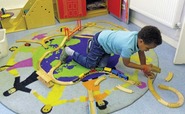Robust procedures and trustworthy staff are key, finds Katy Morton.

Like any other business, early years settings are at risk of financial crimes that can result in significant loss of funds, be very damaging to a nursery's reputation and even lead to closure.
Providers without a general awareness of the law or robust and transparent systems in place could leave themselves open to crimes such as fraud, theft or money laundering.
On top of this, owners and managers need a real understanding of how the free entitlement, funding formulas and mechanisms work, so they can be sure the amount of money they receive is correct.
'While local authorities are increasingly auditing the application of early years entitlement funding, they may find out too late that there is a problem,' says Catriona Nason, director of business support service Daycare Doctor. 'Having robust processes and procedures in place can help providers protect their business.'
Ms Nason says that a lot of providers are worried about fraud, particularly after the Honeytree Day Nursery case at the beginning of this year, where the former manager was sentenced to ten months in jail for stealing thousands of pounds.
Lisa Phillips stole more than £16,000 in childcare fees from parents for the care of their children. Between October 2011 and July 2013, she recruited 21 children as young as two to Honeytree in Bristol, but did not officially register them.
The nursery's managing director discovered there was a child at the setting who wasn't on the appropriate rotas nine months after Ms Phillips started stealing the money. He later found an email showing that the
University of the West of England had paid £240 for a student placement to Ms Phillips' bank account.
Ms Phillips pleaded guilty to fraud by abuse of position on 24 January 2014.
HOW TO PROTECT YOURSELF
According to Ms Nason, owners and managers who fall victim to fraud and related financial crimes in their settings often do so because of the fundamentals of their internal financial controls, essential checks and procedures.
'The onus is on the provider to ensure adequate internal and financial controls are in place. These help owners safeguard their assets in a way that identifies and manages risk and ensures the quality of financial reporting,' she explains.
'For remote or semi-remote owners, boards or committees, they need to devise quality management controls and checks that sample the day-to-day activity of the staff.'
Peter Etherington, a solicitor specialising in employment law, also advises that nurseries have sound financial procedures in place to protect themselves against potential financial crimes, along with carrying out DBS checks on staff.
He adds, 'Providers should also have good contractual cover that allows them to claw back money from staff wages if the worst does happen.'
Ms Nason advises that nursery owners undertake a full independent audit at least once a year, particularly if they have multiple sites.
'Nurseries need robust procedures in place to cover the handling of money, new admissions, data protection and whistleblowing,' she says.
'Where possible, get parents to pay by standing order or make online payments via your website for deposits, outings and extra sessions. Information about payments should be included in a nursery's contract to parents. If an agreement isn't set out straightaway, nurseries could have a problem.
'Settings that do accept cash, perhaps because a parent doesn't have a bank account, should ask those parents to bring the money to the office and not hand it to a member of staff.'
Ms Nason adds that it is imperative that nurseries always have a paper trail. 'A record should always be made of any cash or cheque payment and extra sessions administered with an "extra session form", which is signed and dated and clarifies how the payment was made,' she explains.
'Managers should complete a monthly report, which includes information about any new children, the date they started, their age and any children leaving the setting. These type of documents can be created through software systems.'
Equally important is having dependable staff who owners can trust, says Ms Nason. She recommends always listening to staff and regularly capturing their feedback because this can provide early warning signs of potential problems.
In settings where owners are one step removed, or where a nursery is part of a larger group, Ms Nason says it is essential that staff know how to get in touch with the person in charge of the business.
RIGOROUS SYSTEMS
At Paintpots Pre-School and Nursery in Southampton (pictured), having a paper trail in place at its seven settings means the group can keep track of any cash payments, an aspect of the business it counts as 'high risk'.
'While we have recently implemented principles whereby we don't generally accept cash, we manage by exception as we would rather take cash from parents as payment than nothing at all,' explains owner David Wright.
The nursery group, which has an administrative team in-house that deals with payments, only accepts cash in the morning so it can be banked the same day. Last year, it stopped accepting cheque payments because of the increased potential for things to go wrong.
'Parents who pay by cash are always given a receipt and they know to expect this,' says Mr Wright. 'Payments are registered on our computer software programme within a child's report and noted down in our cash book, which acts as a manual back-up. Only managers and deputy managers can sign to say payment has been received.
'Cash is a nightmare, as it isn't traceable like vouchers or standing orders. That is why we provide parents with receipts. We have receipt books upstairs and downstairs in the nurseries and hand write receipts, which makes it a lot easier for managers who are busy looking after children and managing the setting.'
For standing orders, Paintpots has a separate account for parents to pay into, details of which are included in its welcome pack that parents receive when they register their children.
'While our systems aren't 100 per cent foolproof, there are so many people involved in the process of handling payments that I don't think there would be scope for financial crimes to be committed at our settings,' says Mr Wright.
QUESTION OF TRUST
Having trustworthy staff is a top priority at House of Rompa Day Nursery in Wilmslow, Cheshire.
Owner Des Forrest (pictured), who takes a very hands-on approach to managing the 40-place setting, believes having reliable staff is one of the most effective ways of preventing fraud and other financial crimes at the setting.
'Trustworthiness is really important at the nursery and we have this written in to our policies,' she says.
'We are a small setting and some parents leave their house and car keys with us if they are going to work by train or their partner is coming to pick up their child.'
She adds, 'The key is to get the right systems in place and make sure staff know what the standards are.'
House of Rompa uses a number of systems, including an out-of-house bookkeeper and accountant. 'I think where a lot of nurseries go wrong is not having someone in place like a bookkeeper to stay on top of things,' she says.
Like Paintpots, House of Rompa does not generally accept cash from parents for fees. Ms Forrest says that most parents pay with childcare vouchers through salary sacrifice, so it is easy for both them and the nursery to keep track of payments. Other regular payments are paid by standing order.
'I ensure everything at the nursery is checked and I am very aware that I am accountable for everything that happens at the setting,' she says.
MORE INFORMATION
- For a free internal financial controls guide, email catriona@daycaredoctor.co.uk with 'Free guide' in the subject line
STAFF SUITABILITY
To support nurseries with procedures for checking staff suitability and disqualification, the National Day Nurseries Association has published a new factsheet.
Entitled 'Staff suitability and disqualification', the factsheet clarifies the current legal requirements for ensuring staff are suitable to work with children.
It includes reasons why a person might be disqualified from working with children under the Childcare Act 2006, including if a provider or nursery worker is living in a household with a person who is disqualified.
It also covers how to apply for a waiver if a member of staff is disqualified from working with children, information on employment law and best practice tips.
The factsheet can be downloaded at www.ndna.org.uk/Resources/NDNA/Public%20Factsheets/DisqualificationFS.pd f.









